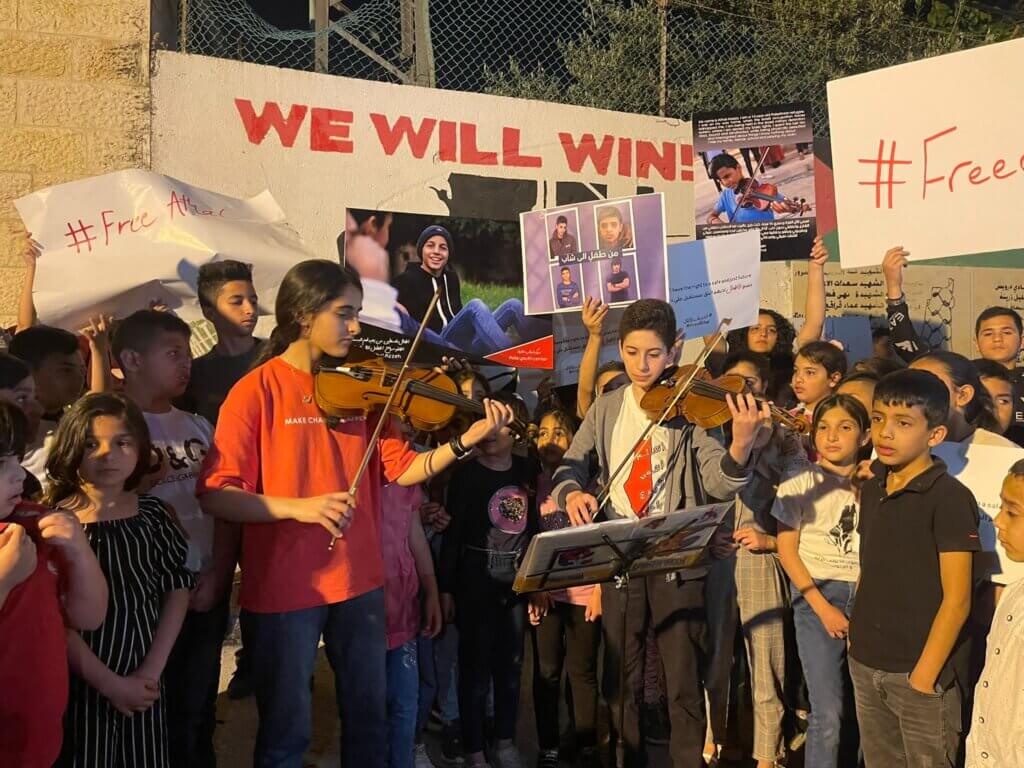Photo: The campaign to Free Athal al-Azzeh, posted by the Aida Youth Center. (Instagram)
Last week a group of Palestinian kids stood outside their local youth center in the Aida Refugee Camp, amid the backdrop of Israel’s separation wall and a permanent military base in the camp, and played a song on their violins.
The song was dedicated to their friend and classmate, 14-year-old Athal al-Azzeh. It was a song for freedom.

Athal al-Azzeh’s classmates and fellow violinists hold a demonstration calling for his release. (Photo courtesy of the Aida Youth Center)
Athal was arrested by the Israeli military in mid April as he was walking to his grandma’s house.
He said he was ambushed by a group of soldiers who hopped out of a military jeep, aggressively detained him, and threw him on the ground of the military base near Aida Camp, where they kicked and beat him.
For close to two weeks Athal was interrogated on a daily basis, during which time Israeli interrogators and security officials attempted to coerce him into a confession. They accused him of throwing stones and burning tires – an offense that has landed countless Palestinian children in Israeli prison.
After 12 days of being interrogated without the presence of a lawyer or his parents, Athal was released on bail. He has another court date later this month, during which he could be sentenced to time in prison.
In the midst of his imprisonment, as he sat wondering what his friends and family were doing, and if he’d ever play his violin again, Israeli Hasbara officials were attempting to justify his arrest to millions of people on the globe.
Apparently, according to Israel, a Palestinian kid who throws stones and burns tires towards an army – that’s illegally occupying his hometown – makes him antisemitic, and “violent against Jews.”
While Athal’s story skyrocketing to the global stage isn’t something that happens every day, Athal’s story itself is not unique.
Every year, hundreds of Palestinian children are arrested by the Israeli military, and imprisoned by Israeli military courts that boast a conviction rate of over 99%. The most common charge brought against Palestinian children is stone throwing.
It feels wrong to say that Athal, who was arrested, beaten, and interrogated by one of the world strongest and most well funded security apparatus, was one of the lucky ones.
Currently, there are 160 child prisoners being held in Israeli prison. Many of them have spent months, even years in prison, missing out on school, playing with their friends, and growing up between the loving arms of their family members.
In the years I’ve lived and worked in Palestine, I’ve spoken to countless child prisoners who were forced to drop out after missing too much school during their imprisonment. Others never recover from the abuse and mistreatment they face.
In an interview with Middle East Eye, Athal said that when he was taken to the detention center after his arrest, he was “just thinking about all the things I was going to miss. I thought about my family, and how they don’t know where I am.”
“I thought about my school, my friends, and my music classes. I felt like my dreams were ending.”
Seeing Athal free and back in the arms of his family and friends brings about both feelings of relief and sadness. Relief that for now, one less Palestinian child has been sent to languish inside Israeli prison, and sadness for all the others who have lost their childhood to arbitrary detention.
His story reminds me of that of a young boy, also from the Aida camp and an active participant in the youth center, who I would frequently pass by on the street on my way home.
One evening, Israeli forces raided the camp and arrested him. He was 15 at the time. Nearly two years passed, and the same smiling boy who would stand on the steps of the center was nowhere to be found. His family and friends were left for years awaiting his return.
A few weeks ago I was walking home and passed a young gentleman on the street. He said hello, with a familiar smile, and I took a double take. It was that same boy, but now he was much taller and larger than before, with a little more facial hair and blemishes that weren’t there the last time I saw him.
He had the same kind and smiling face, but he was no longer that little boy who used to play around with his friends after school. As far as society was concerned, he was now a young man.
Yet another Palestinian young man who had lost his childhood to Israel’s “justice” system.


